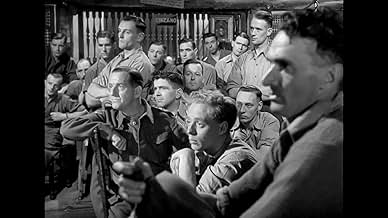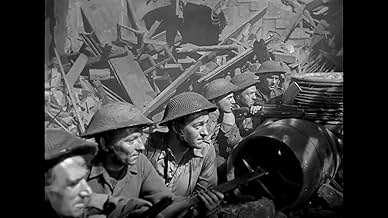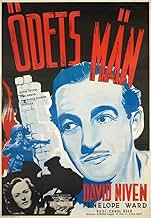VALUTAZIONE IMDb
6,9/10
2380
LA TUA VALUTAZIONE
Aggiungi una trama nella tua linguaWorld War II drama that follows a group of British draftees, starting with their rigorous basic training, and ending with their deployment in North Africa.World War II drama that follows a group of British draftees, starting with their rigorous basic training, and ending with their deployment in North Africa.World War II drama that follows a group of British draftees, starting with their rigorous basic training, and ending with their deployment in North Africa.
- Regia
- Sceneggiatura
- Star
- Premi
- 1 vittoria in totale
Hugh Burden
- Pte. Bill Parsons
- (as Hugh Burdon)
Jimmy Hanley
- Pte. Geoffrey Stainer
- (as Jimmie Hanley)
William Hartnell
- Sgt. Ned Fletcher
- (as Billy Hartnell)
A. Bromley Davenport
- Chelsea Pensioner
- (as Bromley Davenport)
Renée Asherson
- Marjorie Gillingham
- (as Renee Ascherson)
Recensioni in evidenza
THE WAY AHEAD is to some extent a cliche-driven movie, but given the timeframe of its production, I feel it portrays very well the mindset of the ordinary citizen of a country under extreme duress, as well as the tribulations of the many regiments being reconstituted as the war progressed seemingly forever. While it is difficult for us to imagine what it must have been like to live under the constant spectre of loss and possible defeat, even some understanding of the way things were for the British in 1944 will permit a casual viewer of THE WAY AHEAD to appreciate its positive message and the call-to-duty which it implies.
When compared against many of the similar American WW2 'propaganda' films, THE WAY AHEAD comes across as a down-to-earth story which I'm sure many could identify with at the time. For us, the 21st-century viewer, this movie is a welcome glimpse of the British perspective back then, unique in both plot and characterization compared to the more common U.S. fare of the period. In addition, it provides the enthusiast with dozens of rare snapshots of the use of unique British Commonwealth WW2 equipment.
When compared against many of the similar American WW2 'propaganda' films, THE WAY AHEAD comes across as a down-to-earth story which I'm sure many could identify with at the time. For us, the 21st-century viewer, this movie is a welcome glimpse of the British perspective back then, unique in both plot and characterization compared to the more common U.S. fare of the period. In addition, it provides the enthusiast with dozens of rare snapshots of the use of unique British Commonwealth WW2 equipment.
I really can't understand some of the more negative comments from some reviewers from the USA about this movie. For me, it is far superior to equivalent American wartime propaganda movies (including enjoyable but hardly realistic efforts such as 7 Graves To Cairo and Sahara), and made and acted by a British cast who were serving servicemen as well (unlike a certain J. Wayne or H. Bogart). Carol Reed gives us on the surface a cliche ridden movie but his gritty visual style which would become his trademark plus a script that still gives depth to a by now familiar concept lift this way above other movies made at the time.
The soldiers don't look pristine and for most of the time, don't act heroically until the last 5 minutes. They're not an elite unit (as in Sands of Iwo Jima), they grumble, complain and stagger their way to the front lines but nor are they goofballs, pranksters or loveable rogues. They are ordinary men in difficult times, which was what the film makers wanted to show. They are not all broad stereotypes either; some, like the characters Davenport or Brewer, may on the surface seem like the upper class toff and the cheeky cockney but again, the way they interplay with the rest of the cast, they become more than just representatives of their class.
For an old war movie, I was impressed with the action. Early on, when the two old soldiers are talking about how much better it was in the army in their day, we get a juxtaposed montage of David Niven in training, showing how hard it is. A lot of the burning troop ship shots are done hand held, which adds to the tension. The Tunisia scenes look very authentic and see how Reed indulges in rapid cutting, disorienting explosions and run down and dirty art direction. The only film that comes close to achieving this kind of grittiness in the war years is "Guadalcanal Diary".
The soldiers don't look pristine and for most of the time, don't act heroically until the last 5 minutes. They're not an elite unit (as in Sands of Iwo Jima), they grumble, complain and stagger their way to the front lines but nor are they goofballs, pranksters or loveable rogues. They are ordinary men in difficult times, which was what the film makers wanted to show. They are not all broad stereotypes either; some, like the characters Davenport or Brewer, may on the surface seem like the upper class toff and the cheeky cockney but again, the way they interplay with the rest of the cast, they become more than just representatives of their class.
For an old war movie, I was impressed with the action. Early on, when the two old soldiers are talking about how much better it was in the army in their day, we get a juxtaposed montage of David Niven in training, showing how hard it is. A lot of the burning troop ship shots are done hand held, which adds to the tension. The Tunisia scenes look very authentic and see how Reed indulges in rapid cutting, disorienting explosions and run down and dirty art direction. The only film that comes close to achieving this kind of grittiness in the war years is "Guadalcanal Diary".
"The Way Ahead" is an interesting film produced in Britain during World War II to support the war effort by drawing on the talents of an outstanding group of noted British personalities, including Erik Ambler, Carol Reed, Peter Ustinov. The actors comprise and ensemble of some of the most recognizable British character actors of the 1940s and 1950s, not least among whom are David Niven and Peter Ustinov, who actually were serving in the British Army at the time.
The plot follows a polyglot assortment of civilians who are drafted into the British Army at the Beginning of World War II, undergo basic training and eventually emerge as an efficient fighting unit. It is not a new story but it is done very well in this case, thanks to excellent writing and direction, and the equally expert ensemble cast.
However, I must admit that I have only seen this film in the United States under it's alternative title, "the Immortal Battalion". I could not help coming away with the suspicion that the original film must have been somewhat cut and reedited before release in the U.S. I don't know for a fact if that was the case, but certain hints here and there in the story line, as well as certain odd gaps in continuity, suggest that may have been the case. I find it difficult to believe that Erik Amber, Peter Ustinov and Carol Reed would have been satisfied with such clumsiness of production, so I can only assume that the film must have been clumsily reedited later by somebody else. For that reason, I find it difficult to judge this film fairly without comparing it with the original UK version, which I strongly suspect differs somewhat from the version shown in the U.S. Nevertheless, I still recommended it highly.
The plot follows a polyglot assortment of civilians who are drafted into the British Army at the Beginning of World War II, undergo basic training and eventually emerge as an efficient fighting unit. It is not a new story but it is done very well in this case, thanks to excellent writing and direction, and the equally expert ensemble cast.
However, I must admit that I have only seen this film in the United States under it's alternative title, "the Immortal Battalion". I could not help coming away with the suspicion that the original film must have been somewhat cut and reedited before release in the U.S. I don't know for a fact if that was the case, but certain hints here and there in the story line, as well as certain odd gaps in continuity, suggest that may have been the case. I find it difficult to believe that Erik Amber, Peter Ustinov and Carol Reed would have been satisfied with such clumsiness of production, so I can only assume that the film must have been clumsily reedited later by somebody else. For that reason, I find it difficult to judge this film fairly without comparing it with the original UK version, which I strongly suspect differs somewhat from the version shown in the U.S. Nevertheless, I still recommended it highly.
This is a good film that was intended to bolster morale during World War II. The cast is very good and headed by David Niven. This is a story primarily of 8 men of different backgrounds who survive their basic training and end up driving Rommel out of North Africa. The film is primarily about how men develop character when push comes to shove and there isn't a whole lot of action. Good story and worth seeing for the strong cast alone.
The version of The Way Ahead that I have is one that was edited for the American market and has a narration by US war correspondent Quentin Reynolds. It was his narration that sets the stage for a wartime tribute to the civilians who volunteered for king and country at a time of their nation's greatest peril.
When war in Europe was declared David Niven was one of the British stars in America that went back to serve. Since he had been in the army before taking up acting, he was able to secure a commission. For a good deal of the war he was a training officer and really was drilling the men as we see on Salisbury plain. Some of his time was spent in the commandos in missions to Europe. And he was released to make wartime films Spitfire and The Way Ahead.
The script was written by a 21 year old actor/playwright named Peter Ustinov who has a small role in the film. According to a new biography of Niven in order to secure Ustinov's service, enlisted man Ustinov was attached to officer Niven as his orderly.
A whole lot of faces familiar in the British cinema appeared in The Way Ahead, people like Stanley Holloway, Jimmy Hanley, James Donald, Leo Genn, and Trevor Howard. And it was directed in good style by Carol Reed, one of his earliest films.
One big flaw in the film was that the men who trained with officer Niven and sergeant William Hartnell ended up serving with him in North Africa. Not possible in America and not possible in the UK either. But since the idea was to show camaraderie, I guess that Two Cities Films can be forgiven.
The point of the film and of Quentin Reynolds narration is that in time of peril it is the democracies and not those totalitarian countries with a superman philosophy who have the real strength of character. May it ever be so.
When war in Europe was declared David Niven was one of the British stars in America that went back to serve. Since he had been in the army before taking up acting, he was able to secure a commission. For a good deal of the war he was a training officer and really was drilling the men as we see on Salisbury plain. Some of his time was spent in the commandos in missions to Europe. And he was released to make wartime films Spitfire and The Way Ahead.
The script was written by a 21 year old actor/playwright named Peter Ustinov who has a small role in the film. According to a new biography of Niven in order to secure Ustinov's service, enlisted man Ustinov was attached to officer Niven as his orderly.
A whole lot of faces familiar in the British cinema appeared in The Way Ahead, people like Stanley Holloway, Jimmy Hanley, James Donald, Leo Genn, and Trevor Howard. And it was directed in good style by Carol Reed, one of his earliest films.
One big flaw in the film was that the men who trained with officer Niven and sergeant William Hartnell ended up serving with him in North Africa. Not possible in America and not possible in the UK either. But since the idea was to show camaraderie, I guess that Two Cities Films can be forgiven.
The point of the film and of Quentin Reynolds narration is that in time of peril it is the democracies and not those totalitarian countries with a superman philosophy who have the real strength of character. May it ever be so.
Lo sapevi?
- QuizIn the U.K., this was released on D-Day, June 6, 1944.
- BlooperFollowing some energetic army training, Private Bill Parsons is seen sitting on the grass at the top of a cliff, with his colleagues, exhausted. However, the action then cuts to him being helped up the cliff.
- Citazioni
Pvt. Ted Brewer: Only one good man ever got into Parliament.
Pvt. Herbert Davenport: Oh really? Who?
Pvt. Ted Brewer: Bleedin' Guy Fawkes.
- Curiosità sui creditiThe film ends with THE BEGINNING
- Versioni alternativeThe version seen on American TV under the alternate title "The Immortal Battalion" has been re-edited and extensively cut (from 115 to 91 or 86 minutes) by Ed Fitz with an added preface and epilogue by war correspondent Quentin Reynolds.
- ConnessioniEdited into WW II Theater: The Way Ahead (2022)
- Colonne sonoreIf You Were the Only Girl (in the World)
(uncredited)
Written by Nat Ayer
Lyrics by Clifford Grey
Performed by Tessie O'Shea and soldiers
I più visti
Accedi per valutare e creare un elenco di titoli salvati per ottenere consigli personalizzati
- How long is The Way Ahead?Powered by Alexa
Dettagli
- Tempo di esecuzione
- 1h 55min(115 min)
- Colore
- Proporzioni
- 1.37 : 1
Contribuisci a questa pagina
Suggerisci una modifica o aggiungi i contenuti mancanti



































